10 Books Every Entrepreneur Should Read Before Starting a Business
Starting a business can be an exciting yet daunting endeavour. Whether you are a seasoned entrepreneur or a newbie in the world of startups, knowledge is your most valuable asset. The wisdom, strategies, and insights successful entrepreneurs share in their books can be invaluable. This article will explore ten must-read books that every aspiring entrepreneur should delve into before embarking on their business journey. So, grab your reading glasses and let’s dive into entrepreneurial literature!
Table of Contents
The Lean Startup by Eric Ries
Unlocking the Entrepreneurial Mindset
“The Lean Startup” by Eric Ries is a fundamental guide for any budding entrepreneur. Ries emphasises the importance of creating an efficient and adaptable startup. This book introduces the concept of the Minimum Viable Product (MVP) and teaches entrepreneurs how to validate their ideas, iterate quickly, and build successful businesses from the ground up. It’s a blueprint for a pragmatic approach to entrepreneurship.

Learning from Failure
One of the book’s central themes is learning from failure. Ries argues that failure is essential to the entrepreneurial process and should be welcomed as a chance to learn. By doing so, entrepreneurs can pivot and make the necessary adjustments to create a sustainable business.
Eric Ries’ definition of a startup is an organization committed to creating something new despite facing extreme uncertainty. This definition applies to an individual working in their garage and a group of experienced professionals in a Fortune 500 boardroom. Their shared goal is to navigate the uncertainty and find a sustainable path towards a successful business.
The Lean Startup methodology promotes companies that use resources efficiently and harness human creativity to the fullest extent. Drawing inspiration from lean manufacturing principles, this approach emphasizes validated learning, rapid scientific experimentation, and unconventional practices that accelerate product development, measure actual progress rather than superficial metrics, and gain insights into customer needs. It empowers businesses to pivot quickly and adapt to changing circumstances by adjusting their plans incrementally.
Instead of spending valuable time crafting complex business plans, The Lean Startup presents a method for entrepreneurs, regardless of company size, to continuously test and modify their vision. This approach, developed by Ries, takes a scientific approach to launching and managing successful startups, which is crucial at a time when companies must innovate to thrive.
Key Takeaways:
- Understanding the Lean Startup methodology.
- Acknowledging failure is an essential part of the journey towards success.
- Building a sustainable business through continuous improvement.
Zero to One by Peter Thiel
Innovate or Imitate: The Entrepreneur’s Dilemma
Peter Thiel, co-founder of PayPal and an influential venture capitalist, offers a compelling perspective on entrepreneurship in “Zero to One.” Thiel argues that true innovation occurs when entrepreneurs create something new, moving from zero to one. In this thought-provoking book, he discusses the importance of monopolies, differentiation, and the value of contrarian thinking.
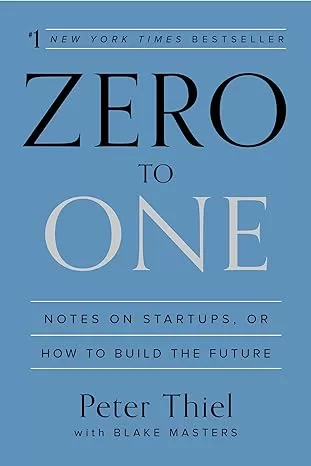
Creating a Monopoly
Thiel believes that successful startups should aim to establish a monopoly in their niche. This monopolistic approach enables businesses to dominate their markets, ensuring long-term success and profitability.
There are still unexplored territories to discover and innovations to be made, which is the great secret of our era. In “Zero to One,” renowned entrepreneur and investor Peter Thiel reveals how we can uncover unique methods to generate these new creations.
When you do something that has already been done before, you’re simply adding more of what’s already familiar to the world. However, creating something new takes us from zero to one. The next generation of innovators won’t be creating an operating system like Bill Gates or a search engine like Larry Page and Sergey Brin. To stand out in tomorrow’s market, businesses must be unique and avoid ruthless competition. That’s how the champions of tomorrow will succeed.
Zero to One offers an optimistic outlook on America’s progress and a fresh approach to innovation by learning to ask value-seeking questions in unconventional places.
Key Takeaways:
- Innovating and creating something new.
- Embracing contrarian thinking.
- Building a monopoly in your niche.
The Hard Thing About Hard Things by B. Horowitz
Navigating the Entrepreneurial Roller Coaster
Entrepreneurship is not all sunshine and rainbows. Ben Horowitz, a seasoned entrepreneur and venture capitalist, shares the harsh realities of building and managing a startup in “The Hard Thing About Hard Things.” This book provides invaluable insights into handling difficult decisions, managing crises, and leading resiliently.
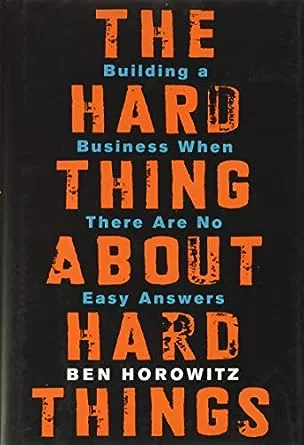
Leadership in Tough Times
Horowitz emphasises the importance of solid leadership during challenging times. He discusses the art of making tough decisions and maintaining the trust of your team when the going gets tough.
Ben Horowitz, the cofounder of Andreessen Horowitz and a highly revered entrepreneur in Silicon Valley, shares invaluable guidance on establishing and operating a startup. His practical insights solve the most challenging issues he must teach in business school. This advice is derived from his widely read Ben’s blog.
Starting a business may seem like a great idea, but only a few people are upfront about the challenges of running one. Ben Horowitz is an expert in this field, gaining valuable insights from his experiences developing, managing, selling, buying, investing in, and supervising technology companies. Despite his love for rap music, he uses lyrics from his favourite songs to amplify his lessons on business. He covers various topics, such as letting go of friends who don’t meet expectations, attracting talent from competitors, cultivating a CEO mentality, and determining when it’s the right time to cash in.
The Hard Thing About Hard Things is valuable for seasoned and aspiring entrepreneurs. Horowitz draws from his personal experiences, offering humour and straight talk.
Key Takeaways:
- Managing the ups and downs of entrepreneurship.
- The art of leadership during crises.
- Building trust and resilience in your team.
Good to Great by Jim Collins
Turning Good Companies into Great Ones
“Good to Great” by Jim Collins is not just for entrepreneurs but for anyone aiming to transform an ordinary company into an exceptional one. Collins and his research team identify the fundamental principles differentiating good companies from great ones. This book is a treasure trove of actionable insights for entrepreneurs striving for greatness.
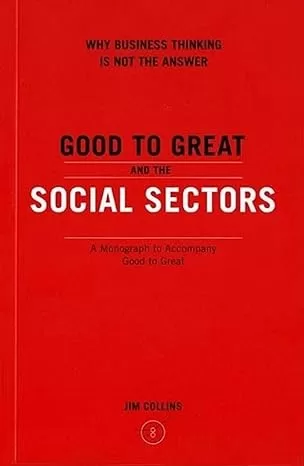
The Hedgehog Concept
Collins introduces the concept of the Hedgehog Concept, which involves finding the intersection of what you are deeply passionate about, what you can be the best in the world at, and what drives your economic engine. This intersection is where greatness lies.
In his book Good to Great, Jim Collins provides valuable insights into the social sectors by answering the most frequently asked questions. Drawing from interviews with more than 100 leaders in the social sector, Collins highlights the relevance of his “Level 5 Leader” and other good-to-great principles in helping these organizations achieve greatness.
Key Takeaways:
- We are transforming an ordinary company into a great one.
- The Hedgehog Concept for business success.
- Sustainable principles for growth.
Think and Grow Rich by Napoleon Hill
The Power of Positive Thinking
Napoleon Hill’s “Think and Grow Rich” is a timeless classic that explores the power of the mind in achieving success. Hill delves into the principles of desire, faith, autosuggestion, and visualisation, emphasising the role of a positive mental attitude in achieving one’s goals.
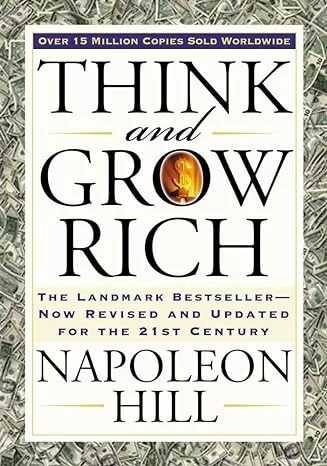
The Law of Attraction
Hill introduces the concept of the Law of Attraction, suggesting that our thoughts have the power to attract success and prosperity into our lives. This book is a testament to the idea that success starts with a mindset shift.
The book “Think and Grow Rich” is widely regarded as the “Granddaddy of All Persuasive Writing.” It was the first to explore the question, “What makes a winner?” The author, Napoleon Hill, listened and learned from the world’s most successful people and is now counted among them. He invested a significant amount of time and effort in developing the “Law of Success,” which serves as the foundation for his books and is masterfully summarized in this one.
The book “Think and Grow Rich,” first published in 1937, is based on the principles outlined by successful figures such as Andrew Carnegie, Thomas Edison, Henry Ford, and other tycoons of that era. The new edition includes stories of present-day successful entrepreneurs and businesspeople, like Bill Gates, Mary Kay Ash, Dave Thomas, and Sir John Templeton, who have applied those principles to achieve wealth. The language and examples have also been updated to be more relevant to modern readers. The revised version was expertly edited by Arthur R. Pell, a well-known author, speaker, and human resources management expert who has extensive knowledge of Hill’s teachings.
Key Takeaways:
- They are harnessing the power of a positive mental attitude.
- The Law of Attraction in achieving success.
- Personal development for entrepreneurs.
The Innovator’s Dilemma by Clayton Christensen
Disruptive Innovation
Clayton Christensen’s “The Innovator’s Dilemma” explores the concept of disruptive innovation, which is the phenomenon where small, innovative companies disrupt larger, established ones. Entrepreneurs can learn valuable lessons on adaptability and innovation from this groundbreaking book.
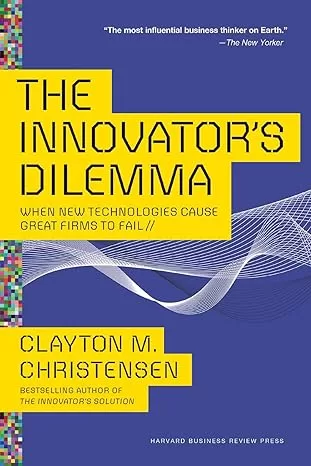
Sustaining vs. Disruptive Innovation
Christensen differentiates between sustaining innovation (improving existing products) and disruptive innovation (creating new markets). Understanding this concept is crucial for entrepreneurs aiming to disrupt industries.
The top-of-the-line exemplary on troublesome development, by prestigious creator Clayton M. Christensen.
His work is referred to by the world’s most famous idea pioneers, from Steve Occupations to Malcolm Gladwell. In this exemplary hit, one of the most influential business books ever, advancement master Clayton Christensen demonstrates that even the most extraordinary organizations can do all that right yet still lose market authority.
Christensen makes sense of why most organizations pass up new floods of development. He says that a fruitful organization with laid-out items will get shoved aside regardless of the business, except if chiefs know how and when to leave conventional strategic policies.
Offering the two triumphs and disappointments of driving organizations as an aide, The Trendsetter’s Problem provides you with rules for gaining by the peculiarity of troublesome development.
Sharp, apt, provocative and reliably noted as one of the most significant business thoughts ever. The Trendsetter’s Quandary is the book without which no administrator, pioneer, or business visionary should be.
Key Takeaways:
- Embracing disruptive innovation.
- The importance of adaptability in business.
- Navigating the ever-changing business landscape.
Made to Stick by Dan Heath and Chip Heath
Crafting Memorable Messages
Every successful business is built on effective communication. In “Made to Stick,” Chip Heath and Dan Heath explore the art of crafting memorable and impactful messages. This book is a valuable resource for entrepreneurs seeking to convey their ideas effectively.
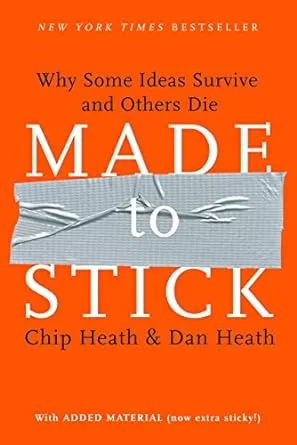
The Success Model
The authors introduce the SUCCES model, which stands for Simple, Unexpected, Concrete, Credible, Emotional, and Stories. This model serves as a framework for creating sticky messages that resonate with audiences.
Mark Twain once noticed, “A falsehood can get most of the way all over the planet before reality could get its boots on.” His perception sounds valid: Metropolitan legends, paranoid ideas, and counterfeit reports course quickly. In the meantime, individuals with significant thoughts — business people, educators, legislators, and columnists — battle to make them “stick.”
In Made to Stick, Chip and Dan Heath uncover the life systems of thoughts that stick and clear up ways to make thoughts stickier, for example, applying the human scale rule, utilising the Velcro Hypothesis of Memory, and making interest holes. En route, we find that tacky messages of different types — from the notorious “kidney burglary ring” lie to a mentor’s illustrations on sportsmanship to a dream for another item at Sony — draw their power from similar six qualities.
Made to Stick will change how you impart. It’s a speedy visit through examples of overcoming adversity (and disappointments):
- The Nobel Prize-winning researcher drank a glass of microbes to make a statement about stomach ulcers.
- Organisationss that employ the Mother Teresa Impact.
- The grade teacher whose reenactment forestalled racial bias.
Key Takeaways:
- Crafting memorable and impactful messages.
- The SUCCES model for effective communication.
- You are establishing a closer connection with your viewers.
Crushing It! by Gary Vaynerchuk
Building Your Brand
In “Crushing It!” Gary Vaynerchuk emphasises the power of personal branding in the digital age. He discusses the importance of leveraging social media platforms and content creation to establish and grow your brand.
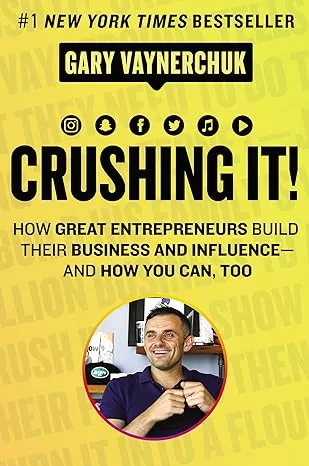
Entrepreneurial Success Stories
The book contains real-life success stories of individuals who used their passion and personal brand to achieve entrepreneurial success. Vaynerchuk’s insights provide a roadmap for building a thriving online presence.
Four-time New York Times top-of-the-line creator Gary Vaynerchuk offers new examples and motivation drawn from the encounters of many forces to be reckoned with and business visionaries who dismissed the anticipated corporate way for chasing after their fantasies by building flourishing organizations and remarkable individual brands.
In his 2009 global hit Crush It, Gary demanded that an energetic individual brand was pivotal to pioneering achievement; in Pounding It!, Gary makes sense of why that is significantly more obvious today, offering his one-of-a-kind viewpoint on what has changed and what standards stay immortal. He likewise shares stories from different business people who have become more affluent — and not simply monetarily — than they at any point envisioned conceivable by following Pulverize It standards. The key to their prosperity (and Gary’s) closely relates to how they might interpret the online entertainment stages and their ability to do anything to make these devices work to their most extreme potential. That Devastating It! helps perusers to do.
Key Takeaways:
- The significance of personal branding.
- They are using social media to expand their business.
- I am learning from entrepreneurial success stories.
Start with Why by Simon Sinek
The Golden Circle
The Golden Circle, a set of three concentric rings of Why, How, and What, is introduced in Simon Sinek’s book “Start with Why.” According to Sinek, influential leaders and organisations begin with “Why” – their mission and conviction – before turning to “How” and “What.”
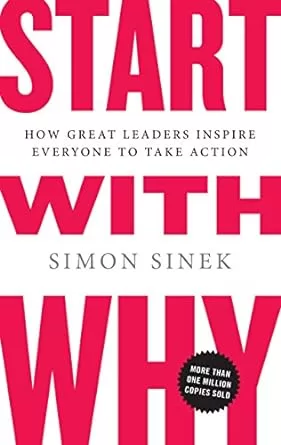
Inspiring Action
Entrepreneurs may motivate action, loyalty, and trust in their clients and staff by clearly communicating the “Why” behind their companies. The effectiveness of purpose-driven leadership is examined in this book.
Simon Sinek initiated development in 2009 to help people enhance their motivation at work and inspire their colleagues and customers. Since then, his ideas have inspired millions, with over 28 million viewers of his TED Talk “START WITH WHY” – making it the third most popular TED video ever.
Sinek begins with a principal question: Why are specific individuals and associations more creative, persuasive, and beneficial than others? For what reason, in all actuality, do a few order more noteworthy unwaveringness from clients and representatives the same? Indeed, even among the effective, why are few ready to rehash their prosperity again and again?
Individuals like Martin Luther Rulers Jr., Steve Occupations, and the Wright Siblings shared little, practically speaking. However, they generally began with why. They understood that individuals would only genuinely become involved with an item, administration, development, or thought once they figured out the WHY behind it.
The book “Start with Why” highlights a common trait among influential pioneers who have significantly impacted the world – they all think, act, and communicate differently from others. Simon Sinek calls this concept “The Golden Circle,” which offers a framework for building organizations, driving innovation, and inspiring people. Ultimately, the key to success lies in “why.”
Key Takeaways:
- Starting with “Why” in business.
- Inspiring action through purpose-driven leadership.
- You are building trust and loyalty.
Outliers by Malcolm Gladwell
The Role of Opportunity and Practice
Malcolm Gladwell’s “Outliers” challenges the notion of individual success as solely a result of talent or hard work. He explores the role of opportunity, practice, and cultural factors in shaping successful individuals and entrepreneurs.
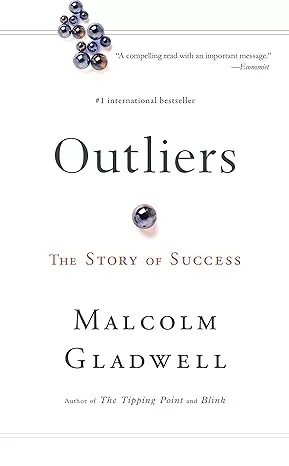
The 10,000-Hour Rule
One of the book’s key concepts is the 10,000-hour rule, which suggests mastery in any field requires approximately 10,000 hours of practice. Entrepreneurs can learn the value of dedication and perseverance from this rule.
From the top-rated writer of The Plane Mafia, gain what separates successful people – from Bill Doors to the Beatles – in this fundamental work from “a solitary ability” (New York Times Book Survey).
In this staggering book recording, Malcolm Gladwell takes us on a scholarly excursion through the universe of “exceptions” – the most splendid, the most popular, and the best. He poses the inquiry: What makes successful people unique?
He responds that we give an excess of consideration to what influential individuals are like and too little thoughtfulness regarding where they are from: That is, their way of life, their family, their age, and the quirky encounters of their childhood. En route, he makes sense of the privileged insights of programming wealthy people, the stuff to be an extraordinary soccer player, why Asians are great at math, and what made the Beatles the best musical crew.
Splendid and engaging, Exceptions is a milestone work that will, at the same time, charm and enlighten.
Key Takeaways:
- Understanding the factors behind success.
- The importance of opportunity and practice.
- Dedication and perseverance are on the path to success.
Conclusion
Embarking on an entrepreneurial journey is a thrilling adventure filled with challenges and opportunities. By immersing yourself in the wisdom of these ten books, you can equip yourself with the knowledge, mindset, and strategies needed to navigate the complexities of starting and growing a successful business.
Now, it’s time to pick up these books, absorb the invaluable insights they offer, and apply them to your entrepreneurial endeavours. Remember, knowledge is the key to unlocking your potential as an entrepreneur.
Frequently Asked Questions
Can these books be valuable for entrepreneurs at all levels, including beginners and experienced ones? Yes, these books cater to a wide range of entrepreneurial experience levels. They offer valuable insights for beginners and seasoned entrepreneurs looking to enhance their skills and knowledge.
Can these books be found in digital or audiobook formats? Absolutely! Most of these books are available in digital formats and as audiobooks, making them accessible and convenient for modern entrepreneurs.
Are there any other books you recommend besides these ten? While these ten books provide a solid foundation, countless other excellent entrepreneurial books exist. Explore additional titles based on your specific interests and business goals.
How can I prioritise reading these books alongside my entrepreneurial responsibilities? Prioritising reading is essential for personal and professional growth. Set aside dedicated time for reading, such as early mornings or before bedtime, and consider it an investment in your entrepreneurial journey.
What if I need more time to read these books? Start with the ones that resonate with your current needs and interests. You can gradually work through the list as time permits. Remember that even reading a single book can offer valuable insights and inspiration for your business.
In conclusion, these ten books enrich the world of entrepreneurship with their wisdom. They offer diverse perspectives and strategies to help you thrive as an entrepreneur. Happy reading, and may your entrepreneurial journey be filled with success and growth!

